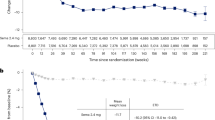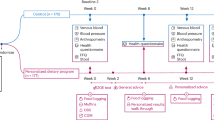Abstract
Background/objectives
To quantify the changes in 10-year cardiovascular disease (CVD) onset, recurrence, and mortality, in relation to transitioning from low to a higher level of adherence to the Mediterranean diet.
Subjects/methods
An individual-level microsimulation was created based on ATTICA (2002–2012, n = 3042 subjects free-of-CVD) and GREECS (2004–2014, n = 2172 patients with acute coronary syndrome (ACS)) studies (in total n = 5214). Eight scenarios regarding the proportion of participants and the size of improvement of the level of adherence to the Mediterranean diet (corresponding to one to ten point increases in MedDietScore) were compared in terms of relative change in CVD incidence and mortality, as well as, the number of preventable CVD events and deaths.
Results
Improving adherence to the Mediterranean diet in at least 10% of the population, a significant relative percentage reduction could be observed in 10-year CVD onset, recurrence, and mortality. At least 851 first CVD events, 374 recurrent CVD events, and 205 CVD deaths per 100,000 of the population could be averted or delayed. In addition, Mediterranean diet clustering revealed that scoring higher in fruits, vegetables, whole wheat products, and legumes was more important than achieving higher scores in low consumption of meat and full-fat dairy products against CVD (all HRs in the former cluster were lower than the latter, indicating a stronger protective effect).
Conclusions
This microsimulation process confirms the added value of the Mediterranean diet in primary and secondary CVD prevention having great achievements even with modifications in a small part of the population (10%), while challenges the orientation of Mediterranean-diet interventions giving higher weights to plant-based part.
This is a preview of subscription content, access via your institution
Access options
Subscribe to this journal
Receive 12 print issues and online access
$259.00 per year
only $21.58 per issue
Buy this article
- Purchase on Springer Link
- Instant access to full article PDF
Prices may be subject to local taxes which are calculated during checkout



Similar content being viewed by others
References
Timmis A, Townsend N, Gale CP, Torbica A, Lettino M, Petersen SE, et al. European society of cardiology: cardiovascular disease statistics 2019. Eur Heart J. 2020;41:12–85.
Roth GA, Johnson C, Abajobir A, Abd-Allah F, Abera SF, Abyu G, et al. Global, regional, and national burden of cardiovascular diseases for 10 causes, 1990 to 2015. J Am Coll Cardiol. 2017;70:1–25.
United Nations. Sustainable development knowledge Platform. https://sdgs.un.org/ Accessed 26 May 2021.
World Health Organization (WHO) Study Group. Diet, nutrition and the prevention of chronic diseases. WHO Technical Report Series 916. Geneva: WHO, 2003.
Wilkins E, Wilson L, Wickramasinghe K, Bhatnagar P, Leal J, Luengo-Fernandez R et al. European Cardiovascular Disease Statistics 2017; 2017.
Aune D, Giovannucci E, Boffetta P, Fadnes LT, Keum N, Norat T, et al. Fruit and vegetable intake and the risk of cardiovascular disease, total cancer and all-cause mortality-a systematic review and dose-response meta-analysis of prospective studies. Int J Epidemiol. 2017;46:1029–56.
Martinez-Lacoba R, Pardo-Garcia I, Amo-Saus E, Escribano-Sotos F. Mediterranean diet and health outcomes: a systematic meta-review. Eur J Public Health. 2018;28:955–61.
Arnold KF, Harrison WJ, Heppenstall AJ, Gilthorpe MS. DAG-informed regression modelling, agent-based modelling and microsimulation modelling: a critical comparison of methods for causal inference. Int J Epidemiol. 2019;48:243–53.
Larsson S, Prioux M, Fasth T, Ternhag A, Struwe J, Dohnhammar U, et al. A microsimulation model projecting the health care costs for resistance to antibacterial drugs in Sweden. Eur J Public Health. 2019;29:392–6.
Pitsavos C, Panagiotakos DB, Chrysohoou C, Stefanadis C. Epidemiology of cardiovascular risk factors in Greece: aims, design and baseline characteristics of the ATTICA study. BMC Public Health. 2003;3:32.
Tsiampalis T, Panagiotakos DB. Missing-data analysis: socio-demographic, clinical and lifestyle determinants of low response rate on self-reported psychological and nutrition related multi-item instruments in the context of the ATTICA epidemiological study. BMC Med Res Methodol. 2020;20:148.
Pitsavos C, Panagiotakos DB, Antonoulas A, Zombolos S, Kogias Y, Mantas Y, et al. Epidemiology of acute coronary syndromes in a Mediterranean country; aims, design and baseline characteristics of the Greek study of acute coronary syndromes (GREECS). BMC Public Health. 2005;5:23.
Kouvari M, Panagiotakos DB, Chrysohoou C, Georgousopoulou E, Notara V, Tousoulis D, et al. Gender-specific, lifestyle-related factors and 10-year cardiovascular disease risk; the ATTICA and GREECS Cohort studies. Curr Vasc Pharmacol. 2019;17:401–10.
Schulze MB, Hoffmann K, Kroke A, Boeing H. An approach to construct simplified measures of dietary patterns from exploratory factor analysis. Br J Nutr. 2003;89:409–19.
Newby PK, Tucker KL. Empirically derived eating patterns using factor or cluster analysis: a review. Nutr Rev. 2004;62:177–203.
Everitt BS, Landau S, Leese M, Stahl D. Cluster analysis. John Wiley & Sons.
Lloyd-Jones DM, Hong Y, Labarthe D, Mozaffarian D, Appel LJ, Van Horn L, et al. Defining and setting national goals for cardiovascular health promotion and disease reduction: the American Heart Association’s strategic Impact Goal through 2020 and beyond. Circulation. 2010;121:586–613.
de Lorgeril M, Salen P, Martin JL, Monjaud I, Delaye J, Mamelle N. Mediterranean diet, traditional risk factors, and the rate of cardiovascular complications after myocardial infarction: final report of the Lyon Diet Heart Study. Circulation. 1999;99:779–85.
Kris-Etherton P, Eckel RH, Howard BV, St Jeor S, Bazzarre TL, Nutrition Committee Population Science Committee and Clinical Science Committee of the American Heart Association. AHA science advisory: lyon diet heart study. benefits of a Mediterranean-style, national cholesterol education program/American Heart Association step I dietary pattern on cardiovascular disease. Circulation. 2001;103:1823–5.
Martínez-González MA, Salas-Salvadó J, Estruch R, Corella D, Fitó M, Ros E, et al. Benefits of the Mediterranean diet: insights from the PREDIMED study. Prog Cardiovasc Dis. 2015;58:50–60.
World Health Organization (WHO). WHO Global action plan for the prevention and control of noncommunicable diseases: 2013–20. 2013. http://apps.who.int/iris/bitstream/10665/94384/1/9789241506236_eng.pdf.
Satija A, Hu FB. Plant-based diets and cardiovascular health. Trends Cardiovasc Med. 2018;28:437–41.
de Souza RJ, Mente A, Maroleanu A, Cozma AI, Ha V, Kishibe T, et al. Intake of saturated and trans unsaturated fatty acids and risk of all cause mortality, cardiovascular disease, and type 2 diabetes: systematic review and meta-analysis of observational studies. BMJ. 2015;351:h3978.
Fontecha J, Calvo MV, Juarez M, Gil A, Martínez-Vizcaino V. Milk and dairy product consumption and cardiovascular diseases: an overview of systematic reviews and meta-analyses. Adv Nutr. 2019;10:S164–S189.
GBD 2013 Risk Factors Collaborators, Forouzanfar MH, Alexander L, Anderson HR, Bachman VF, Biryukov S, et al. Global, regional, and national comparative risk assessment of 79 behavioural, environmental and occupational, and metabolic risks or clusters of risks in 188 countries, 1990-2013: a systematic analysis for the Global Burden of Disease Study 2013. Lancet. 2015;386:2287–323.
Hattori T, Konno S, Munakata M. Gender differences in lifestyle factors associated with metabolic syndrome and preliminary metabolic syndrome in the general population: the Watari study. Intern Med. 2017;56:2253–9.
Chrysohoou C, Panagiotakos DB, Pitsavos C, Kokkinos P, Marinakis N, Stefanadis C, et al. Gender differences on the risk evaluation of acute coronary syndromes: the CARDIO2000 study. Prev Cardiol. 2003;6:71–77.
Anand SS, Islam S, Rosengren A, Franzosi MG, Steyn K, Yusufali AH, et al. Risk factors for myocardial infarction in women and men: insights from the INTERHEART study. Eur Heart J. 2008;29:932–40.
Kouvari M, Yannakoulia M, Souliotis K, Panagiotakos DB. Challenges in sex- and gender-centered prevention and management of cardiovascular disease: implications of genetic, metabolic, and environmental paths. Angiology. 2018;69:843–53.
Mozaffarian D, Afshin A, Benowitz NL, Bittner V, Daniels SR, Franch HA, et al. Population approaches to improve diet, physical activity, and smoking habits: a scientific statement from the American Heart Association. Circulation. 2012;126:1514–63.
Afshin A, Penalvo J, Del Gobbo L, Kashaf M, Micha R, Morrish K, et al. CVD prevention through policy: a review of mass media, food/menu labeling, taxation/subsidies, built environment, school procurement, worksite wellness, and marketing standards to improve diet. Curr Cardiol Rep. 2015;17:98.
Cobiac LJ, Veerman L, Vos T. The role of cost-effectiveness analysis in developing nutrition policy. Annu Rev Nutr. 2013;33:373–93.
GBD 2017 Diet Collaborators. Health effects of dietary risks in 195 countries, 1990–2017: a systematic analysis for the Global Burden of Disease Study 2017. Lancet. 2019;393:1958–72.
Acknowledgements
The authors would like to thank the ATTICA and GREECS study group, investigators.
Funding
This work was supported by a research grant from the Hellenic Atherosclerosis Society received by Matina Kouvari. The ATTICA study is supported by research grants from the Hellenic Cardiology Society [HCS2002] and the Hellenic Atherosclerosis Society [HAS2003].
Author information
Authors and Affiliations
Contributions
MK wrote the manuscript and was responsible for the interpretation of the result. TT implemented the statistical analysis. DBP and CP were responsible for the study design and implementation while they critically reviewed the manuscript. EG was involved in the 10-year follow-up of the study and critically reviewed the manuscript. KS, MY, TP, and CC critically reviewed the manuscript.
Corresponding author
Ethics declarations
Competing interests
The authors declare no competing interests.
Additional information
Publisher’s note Springer Nature remains neutral with regard to jurisdictional claims in published maps and institutional affiliations.
Supplementary information
Rights and permissions
About this article
Cite this article
Kouvari, M., Tsiampalis, T., Chrysohoou, C. et al. A Mediterranean diet microsimulation modeling in relation to cardiovascular disease burden: the ATTICA and GREECS epidemiological studies. Eur J Clin Nutr 76, 434–441 (2022). https://doi.org/10.1038/s41430-021-00967-6
Received:
Revised:
Accepted:
Published:
Issue Date:
DOI: https://doi.org/10.1038/s41430-021-00967-6



